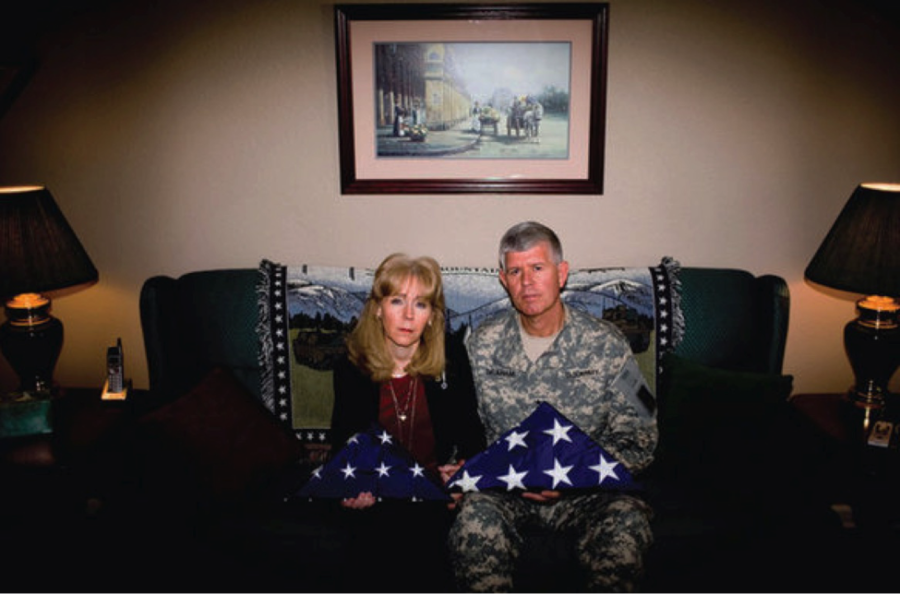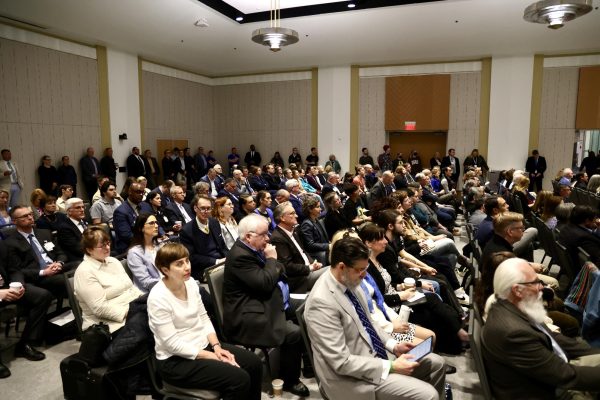Graham family has lost two battles, but their war is far from over
August 30, 2015
By Marc Thomas
Carol Graham’s story focuses on her two sons, who fought different battles and lost, and how Carol was able to channel her sorrow into combating suicide.
Carol’s youngest son, Kevin Graham, died by suicide on June 21, 2003, after losing his battle with depression. Eight months later, on Feb. 19, 2004, the elder, Jeff Graham was killed by an IED while deployed in Iraq.
Carol Graham, a Frankfort native, will kick off National Suicide Prevention Month on Sept. 1, 2015, speaking about the stigma of mental health at UK and share her story with an audience at the W.T. Young Library.
The Graham’s story is featured in a new book written by Yochi Dreazen, entitled “The Invisible Front.”
In part, The Invisible Front aims to quash the idea that suicide victims are weak-minded or flawed individuals. The book suggests that this idea is deeply embedded within the culture of our nation’s military.
Both sons sought to follow in their father’s footsteps, a retired Major General. Kevin and Jeff were ROTC cadets at UK. Jeff graduated with an engineering degree and Kevin aspired to become an Army physician.
“It was always their dream to attend the University of Kentucky and to live together,” Carol said of her children. In 2002, the youngest Graham child, Melanie, joined her brothers at UK to study nursing.
“They had always been each others best friends,” Carol said.
In October, 2002, Kevin Graham was diagnosed with depression and was prescribed medication to treat the disease. However, Kevin soon realized that taking medication for a mental health diagnosis could disqualify him from future military service.
The last time Mark and Carol Graham were together with all of their children was at Jeff’s graduation in May of 2003.
Both parents noticed an improvement in Kevin’s physical appearance, which they attributed to an increased exercise regimen outside of the mandatory morning PT set for all ROTC students. However, Kevin’s physical appearance only provided a façade — he was deteriorating psychologically.
Six weeks later, on the morning of June 21, 2003, Jeff and Kevin planned to meet up and play a round of golf together. When Kevin never showed up, Jeff called Melanie and asked her to check on their brother. Moments later, Melanie was horrified to discover that Kevin had died by suicide during the night in their apartment.
Melanie never set foot in the apartment again.
“As a mother, I felt like I failed,” Carol said. “I felt like the worst possible mother.”
From there, psychiatrists began to reach out to help the Grahams cope with Kevin’s death. Carol said the first time she heard the term ‘Post-Traumatic Stress Disorder’ was after Kevin’s death.
The night before Jeff’s deployment to Iraq, a soldier who was fighting his own battle with depression reached out to him. After the soldier left, Jeff called his parents and begged them to continue to raise suicide awareness — not just across college campuses, but in the military too.
Carol said Jeff told her that she should “continue what (she is) doing, because there’s so many other Kevin’s out there.”
As the Graham family began to heal, tragedy struck again when the eldest child, Jeff, was killed while deployed in Iraq.
“They died fighting different battles,” Carol said.
Carol and Mark said they imagine if Jeff survived, he would be living with PTSD and other invisible wounds in addition to physical impairments.
The Grahams have since set up the Jeffrey and Kevin Graham Memorial Fund, which established a suicide prevention program at UK.
“For us to find healing, we had to find a way to tell both of their stories,” Carol said.
The memorial funds the Question, Persuade and Refer program, commonly known as QPR. QPR aims to familiarize UK staff and students about the warning signs of a potentially suicidal person.
Dr. Mary Chandler Bolin, Director of the UK Counseling Center, is a QPR master trainer who works with the program, along with several staff members from the UK Counseling Center.
Megan M. Marks, senior staff psychologist and outreach coordinator at the UKCC, said the path to suicide for each person is never the same.
“There could be some biological factors that might be at play for somebody, there might be some psychological factors or even environmental factors,” Marks said.
“A type of trigger might be not getting into the college or major they want or not getting the job or internship they wanted.” Marks said. “There’s not one typical path that leads to suicide.”
In Kevin Graham’s situation, Carol said he had expressed concern about his own mental health. Kevin told her that he felt like his brain didn’t work properly. Carol said she thinks Kevin lost hope because he would have been disqualified from military service over his anti-depressant medication.
According to Marks, hopelessness is a major factor in suicidal behavior. Although many college students experience common triggers that could lead to suicide, most don’t seriously consider or attempt it.
“During the 2014-15 academic year, approximately 11 percent of UKCC clients reported that they had made a suicide attempt at some point in their life,” she said. “These reports are consistent with national statistics for college students and suicidal behavior.”
The American Association for Suicidology says suicide is the second leading cause of death for college students in this country, following accidents.
However, there are ways people can reduce suicidal ideation.
“Something students can do to take care of themselves is to make sure they are well connected to a support system,” Marks said.
These support systems can include family, friends, a Greek community or student organization or a religious community. Marks said simple things like getting enough rest and exercise can help raise a person’s mood, as well as setting aside time to relax or do an activity they enjoy.
Marks also said that there are signs people can look out for in a person contemplating suicide.
Verbal clues, withdrawal from friends and family and poor hygiene may indicate suicidal risk, Marks said. A person who thinks about committing suicide may also give away prized possessions or suddenly take an interest in weapons.
Verbal clues could be direct statements like “I wish I was dead,” or coded statements such as, “You don’t have to worry about me for long.”
According to the Suicide Prevention Resource Center, firearms are the most commonly-used weapons to commit suicide and account for nearly 50 percent of suicide-related deaths.
If you notice any of these warning signs from a person, you should express concern to them, Marks said. Ways to intervene include listening, support and letting them know that there are resources on campus to help.
Kentucky’s suicide rate ranks higher than the national average based on data from the American Foundation for Suicide Prevention. At least 42 suicide attempts and two suicide-related deaths occur in Kentucky every day, according to the Suicide Prevention Resource Center.
The UKCC will also sponsor a QPR-a-Thon in mid-October, an event where students, faculty and staff have at least five opportunities to receive free training to be QPR Gatekeepers.
If you would like to learn more about services offered by the UKCC or request an appointment, call 859-257-8701.
UKCC, located at 106 Frazee Hall, is open Monday through Friday from 8:00 a.m. to 4:30 p.m.
If you or somebody you know is in crisis, the National Suicide Prevention Lifeline is available 24 hours a day, seven days a week at 800-273-8255.
























































































































































